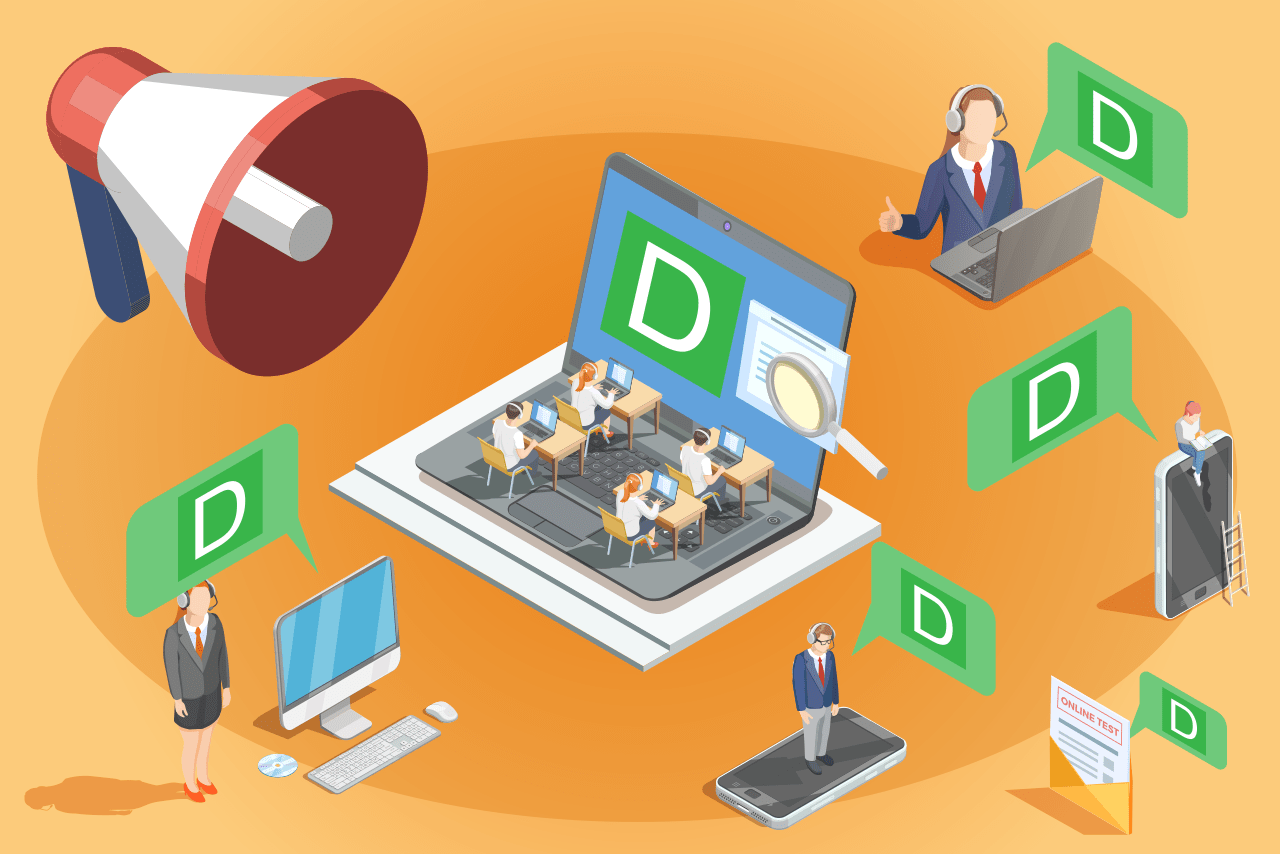
In today's rapidly evolving financial landscape, banks must stay ahead of industry changes, regulatory updates, and technological advancements. Comprehensive employee training programs are essential for a bank's success, productivity, and overall reputation.
Incorporating these types of training programs into a bank's development strategy ensures employees are well-prepared to navigate the complexities of the banking industry, deliver exceptional service, and contribute to the bank's success and growth.
Table of contents
Benefits of effective bank employee training programs
The types of bank employee training courses your bank should have
How DeskAlerts can help deliver bank employee training
Benefits of effective bank employee training programs
There are numerous benefits to the bank in developing and delivering comprehensive employee training programs:
- Bank training programs ensure employees learn effective communication skills, sales techniques, and product knowledge. Well-trained staff can provide personalized service that sets the bank apart and fosters customer loyalty.
- The financial sector is heavily regulated, and non-compliance can lead to significant legal and financial repercussions. Training employees on industry laws and internal policies helps banks avoid costly mistakes and maintain their reputation.
- As employees gain new skills and stay current with industry trends, they become more engaged and motivated. This leads to higher retention rates, saving the bank time and money on recruitment and onboarding.
- With the rise of digital banking, employees must stay adept at using new tools and platforms. Training equips them with the necessary skills to navigate and excel in the digital era.
IMPROVED COMMUNICATIONS IN FINANCIAL SECTOR
The types of bank employee training courses your bank should have
Banks operate in a highly regulated and competitive environment, making it essential to have well-trained employees to maintain compliance, provide excellent customer service, and stay abreast of industry trends. To achieve these goals, banks should offer a variety of training programs tailored to different roles and levels within the organization:
- Compliance training
Compliance training is crucial in the banking industry due to the complexity of laws and regulations governing financial institutions. Programs cover anti-money laundering (AML), Know Your Customer (KYC), data privacy laws, and other regulatory requirements. Keeping employees updated on these topics helps banks avoid penalties and reputational damage.
ENSURE COMPLIANCE WITH BANK POLICIES AND PROCEDURES
- Customer service and sales training
Excellent customer service is a cornerstone of banking success. Training programs should teach employees effective communication, problem-solving, and conflict-resolution skills to enhance customer relationships. Sales training is also vital, helping staff understand the bank's products and services and how to match them to customer needs.
- Product knowledge
Employees must have a thorough understanding of the bank's products and services, including loans, mortgages, investment options, and digital banking solutions. Bank training programs should ensure staff can effectively communicate the benefits and features of these offerings to customers.
- Risk management and fraud prevention
Banks face various risks, including credit, market and operational risks. Training in risk management helps employees identify and mitigate potential threats to the bank's stability. Fraud prevention training educates staff about recognizing signs of fraud and taking appropriate action.
- Cybersecurity training
Cybersecurity threats continue to evolve, posing significant risks to banks and their customers. Training in banking should include programs on data protection, secure handling of customer information, and awareness of cyber threats help employees safeguard sensitive data and maintain trust.
LEARN MORE ABOUT CYBER SECURITY IN BANKING
- Technology updates and digital banking
As banks embrace digital transformation, employees must be proficient in using new technologies and platforms. Training on digital banking tools, online customer service, and emerging technologies ensures employees can provide seamless experiences and leverage digital solutions effectively.
- Leadership and management development
For employees in leadership or aspiring to leadership roles, training programs should focus on developing management skills, strategic thinking, and decision-making. These programs prepare employees to lead teams effectively and drive organizational success.
- Diversity and inclusion training
Promoting a diverse and inclusive workplace is crucial for banks. Training programs should educate employees on the importance of diversity, equity, and inclusion, as well as how to foster a welcoming and respectful work environment.
- Communication and interpersonal skills
Effective communication and interpersonal skills are vital for fostering collaboration, resolving conflicts, and building strong relationships with colleagues and customers. These types of soft skills training for bank employees ensure they work more effectively within teams and contribute to a positive workplace culture.
How DeskAlerts can help deliver bank employee training

DeskAlerts is a communication and notification system that can be an effective tool for banks to deliver employee training programs efficiently and securely. The system works by using a range of channels and other features to ensure that important information - including training materials - is seen by employees.
Ways it can be used for bank training include:
- Targeted notifications: DeskAlerts enables banks to send targeted notifications to specific groups or departments within the organization. This feature is helpful for customizing training content for different job roles or areas of expertise.
- Timely training updates: Banks can use DeskAlerts to keep employees informed about upcoming training sessions, changes in schedules, or new training materials. This ensures employees stay up-to-date and engaged in ongoing development.
- Delivery of training materials: Banks can use DeskAlerts to distribute training materials, such as e-learning modules, videos, and documents, directly to employees' desktops. This streamlined delivery ensures that employees have easy access to necessary resources.
- Interactive quizzes and surveys: DeskAlerts has a module for sending interactive quizzes and surveys, allowing banks to assess employees' understanding of training materials and gather feedback on training programs. This data can be used to improve future training initiatives.
- Follow-up and reminders: Banks can send follow-up alerts and reminders to ensure employees complete training programs on time and retain important information.
- Acknowledgment receipts: DeskAlerts messages can be sent with an acknowledgment requirement where employees must accept that they have read the information they’ve been sent. This is an excellent way to keep a record for accountability purposes, particularly when you need to ensure employees understand complex regulatory or legal training that they must comply with.
***
By utilizing DeskAlerts, banks can enhance the efficiency and effectiveness of their employee training programs, ensuring staff are well-equipped to meet the demands of the banking industry and contribute to the bank's overall success. Get in touch with our team today for a free demo to see how DeskAlerts can be deployed in your bank to improve and enhance your training programs.
ORGANIZE MORE EFFECTIVE TRAINING WITH DESKALERTS
Evaluate your current training methods against DeskAlerts, a robust internal communication system designed to improve both employee engagement and business efficiency.
Schedule free online demo right now.

FAQ
How do banks train employees?
Banks train employees using a variety of methods to ensure they are knowledgeable, efficient, and aligned with company policies and industry regulations. New employees typically undergo onboarding programs that include orientation, company policies, and compliance training.
Ongoing training includes workshops, seminars, and online courses on topics such as customer service, financial products, risk management, and cybersecurity. Mentorship programs pair new employees with experienced staff to provide guidance and support.
Banks also emphasize sales techniques and relationship-building for customer-facing roles.
Continuous education is essential to keep employees updated on regulatory changes and emerging trends in the banking industry.
Do banks have training programs?
Banks offer comprehensive training programs for new hires and ongoing development for existing employees. These programs cover a range of topics including compliance, customer service, product knowledge, sales techniques, and industry regulations to ensure staff are well-equipped to perform their roles effectively.
What is the meaning of employee training program?
An employee training program is a structured initiative designed to enhance employees' knowledge, skills, and performance in their job roles. It includes workshops, courses, and on-the-job training to ensure employees are competent and aligned with company goals and industry standards.
Why are employee training programs so important?
Employee training programs are crucial for improving job performance, ensuring employees stay up-to-date with industry standards and regulations, and fostering a skilled workforce.
These programs enhance productivity, boost employee confidence, and contribute to higher job satisfaction and retention, ultimately benefiting the organization's overall success.
 Caroline Duncan
Caroline Duncan









